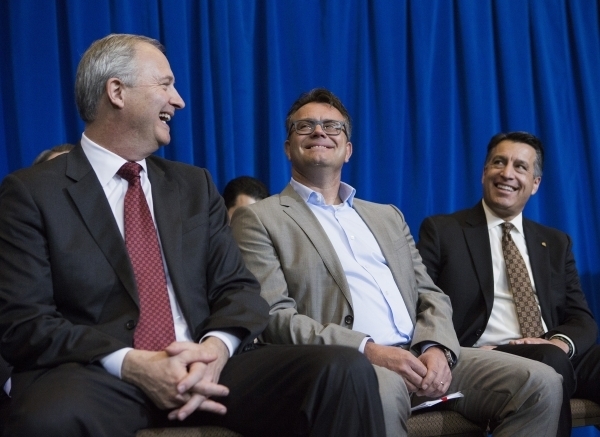Finally, economic development comes South
Now it's Southern Nevada's turn.
With the formal announcement of a deal between the state and Faraday Future to build an electric car manufacturing facility in the Apex industrial park in North Las Vegas, the region has a few reasons to cheer.
Southern Nevada looked on in 2014 as the Nevada Legislature met in special session and approved a huge economic development incentive deal for Tesla Motors to build a battery-making plant near Reno. In 2012, Southern Nevada saw Apple Computer get tax breaks for locating some of its operations in the Biggest Little City, too.
Where, some wondered, was the love for Southern Nevada?
Now, in addition to a project estimated to create more than 13,000 jobs, a $1 billion, 3 million-square-foot facility and $85 billion in economic impact over the next two decades, there are some political wins to be tallied.
First in line is North Las Vegas Mayor John Lee, who started things off with Faraday, based on a tip from a friend. Lee and his city manager, Qiong Liu, got the ball rolling last year, and city officials worked the project for months before the Governor's Office of Economic Development got involved.
Lee said he was inspired by the Tesla deal and originally wanted to cobble together a group of businesses that would spend enough to take advantage of the law that ushered Tesla into the state. "Success breeds success," Lee said. That's true in politics as well as in business, and Lee will certainly benefit once Faraday starts construction in Apex.
Second, Gov. Brian Sandoval. Once derided as the "governor of Reno" for the attention he lavished on the North, Sandoval is now more likely to be remembered as the governor who ushered in a new era of education reforms and a controversial tax plan. But helping to deliver a major project like Faraday to Southern Nevada goes a long way toward dispelling any notion that Sandoval cares primarily about his home region.
Speaking of taxes, Sandoval will have to put his ample political skills to use in answering the most natural of questions: How can he justify giving away up to $217 million over 15 years (even with estimated state and local revenues of $760 million coming from the project over 20 years) in light of the fact that many Nevada businesses will shortly start paying the brand-new commerce tax?
The answer — in addition to a fairly good return on investment — includes the fact that Faraday itself will ultimately pay the commerce tax, at least on vehicles it sells here in Nevada. Not only that, but the Faraday project by itself will increase the region's economic output by up to 4 percent.
And what about the propriety of competing with other states for the project, trying to outbid other governments' offers? "You have to realize the world that we live in. This is competitive," Sandoval said. And thus far in the competition, Nevada seems to be doing pretty well.
Finally, there are the state lawmakers from Southern Nevada who have agitated for projects for their region for a long time and authored the laws that are designed to make it happen. It will be difficult for any Northern Nevada lawmaker — all of whom benefitted from the votes of the Southern Nevadans for Tesla — to reject the smaller-by-comparison Faraday project. But it will be nearly impossible for Southern Nevada lawmakers not to embrace one of the biggest job-creating projects their region has seen in a long time. (Thus far, only Assemblywoman Shelly Shelton, R-Las Vegas, has taken a definite no stance.)
There will be some no votes for sure. But the momentum and the rewards are winds at Faraday's back. This time, it's Southern Nevada's turn.
— Steve Sebelius is a Las Vegas Review-Journal political columnist and co-host of the show "PoliticsNOW," airing at 5:30 p.m. Sundays on 8NewsNow. Follow him on Twitter (@SteveSebelius) or reach him at 702-387-5276 or ssebelius@reviewjournal.com.




























